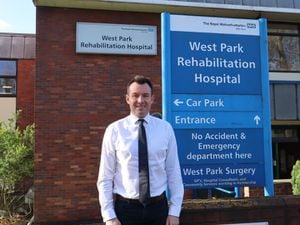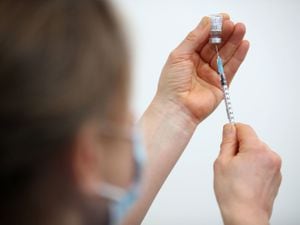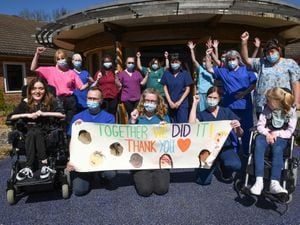University of Wolverhampton plugging the nursing shortage
A shortage of nurses is one of the biggest challenges facing the NHS today.
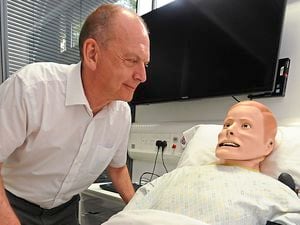
At the moment there are estimated to be 40,000 nursing vacancies across the UK, but that figure is expected to rise to 70,000 over the next five years.
"The workforce is the make-or-break issue for the health service," says Anita Charlesworth of The Health Foundation.
"Unless staffing shortages are substantially reduced, the recent NHS long-term plan can only be a wish list."
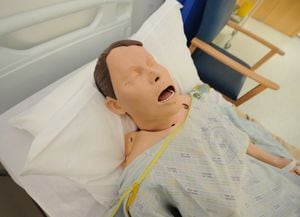
Prof Geoff Layer, vice-chancellor of Wolverhampton University, believes his institution can play a leading role in plugging that gap.
To meet the growing demand, the university is putting the finishing touches to a £5 million new health laboratory in Walsall, which will complement similar centres at the university's campuses in Wolverhampton and Telford. The Wolverhampton lab has also just benefited from a £3 million upgrade, and the buildings are equipped to be just like hospital wards, enabling the university to greatly expand the number of nurses it can train.
The shortage of nurses in the West Midlands has been well-documented. Despite the best efforts of the region's hospital trusts, in March this year there were 1,057 nursing vacancies across the area, an increase of almost 18 per cent over the past five years.
In April this year a patient assessment unit at Telford's Princess Royal Hospital was forced to close for a weekend due to staff shortages. In 2016 the Dudley Group NHS Foundation Trust controversially spent £19,000 on a trip to the Philippines, which resulted in just three new nurses joining the trust.
It is not simply an issue of recruitment. While many hospital trusts have achieved some success in attracting new nurses, growing demands on the health service mean that this will need to continue just to stand still.
It is also not a problem confined to the UK. The shortage of nurses is worldwide,
Prof Layer believes the gap can be plugged locally without having to bring in nurses from overseas.
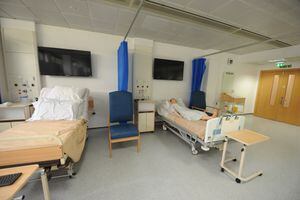
"Every hospital at the moment is trying to recruit nurses from overseas," he says.
"We are saying we can provide nurses locally.
"Three years ago, we recruited 600 new students for our nursing courses, next year we expect to recruit 750. We want to get that to 1,000 new nurses every year."
The university is working in partnership with the main hospital trusts in Wolverhampton, Dudley, Shropshire, Walsall, Sandwell and Burton-upon-Trent to meet the needs of future demand for nurses through its specialist degree programmes.
He says the university's health labs have been carefully designed to replicate what it is like to work in a hospital environment, and are equipped with cutting-edge technology.
"They look just like hospital wards, with computerised robotic patients for our nursing students and paramedics to practise on," he says.
"The robots can simulate what a real patient experiences, they feel pain," he says.
The courses are overseen by Sharon Arkell, director of the university's institute of health, herself a former nurse.
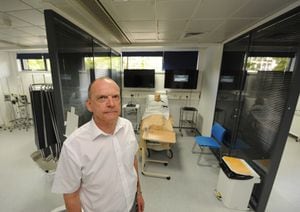
She says the three-year Bachelor of Nursing degree is designed to prepare them for life as a registered nurse by the end of the course.
"The course is very much geared towards giving people the skills to carry out their own research, to critical thinking, handling equipment and problem solving," says Mrs Arkell.
As part of their training, the students will spend extended periods of time working on hospital wards in the area.
The university is also running master's degrees for those who wish to take their learning to another level.
Mrs Arkell qualified as a nurse in 1989, after doing her training at Good Hope Hospital in Sutton Coldfield.
"I wasn't one of those people who always wanted to be a nurse," she says.
"When I was 18 I was looking at my career options, and I did some unpaid work at my local hospital, and decided that's what I wanted to do.
"I think when you go into nursing you want to make help people, if possible, to get better, or if you can't do that, to make them as comfortable as possible. If they aren't going to get better, you went to ensure they have the best death possible with end-of-life care.
"It's a busy job, it's hard work when you go on shift, but if you thrive on working in a busy environment it can be very rewarding."
Mrs Arkell says the job has changed considerably since she finished her training 30 years ago, not least in the speed that patients are dealt with.
"When I started back in 1989, patients would spend long periods in hospital recovering," she says.
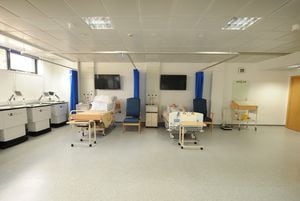
"For example, 30 years ago somebody having a hip replacement would have been in hospital for three weeks, now it's seven days.
"Nowadays people are more likely to recover at home."
She says mental health nursing is an area which has seen major growth in recent years, with demand for nurses trained in this area likely to grow.
Prof Layer says the courses have proved particularly attractive to mature students, and many have not taken the conventional route into education.
"A lot of our nursing students are over the age of 30, they come from a mixture of backgrounds.
"We get people who in the past went to college, people who have worked in the health service and want to become a nurse," he says.
"We get a lot of women who have got a small family, and the kids are now at school. We organise classes around when they are at school, and their shifts can be organised on that basis."
For more information about the nursing courses available at Wolverhampton University telephone 0800 953 3222.

